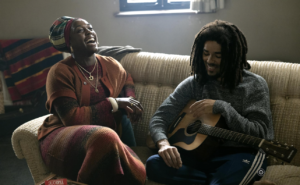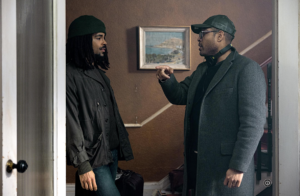
By Robert St. Martin
Los Angeles, CA (The Hollywood Times) 2/14/24 – One of the films featured at this year’s Pan African Film Festival in Los Angeles is Bob Marley: One Love, a new biopic directed by Reinaldo Marcus Green. The film opens citywide today (Valentine’s Day) after its screening at the Cinemark Baldwin Hills in Crenshaw Plaza Monday night. The hagiographic bent of One Love is symptomatic of the modern-day biopic, but the shapelessness of the film’s narrative structure is an even greater hindrance than its plodding pace and anaesthetized tone. It’s hard to know whether to blame this on the meandering editing or the fact that the film has four credited screenwriters. Either way, the end result leaves One Love feeling like the product of an exquisite corpse game, with jarring flashbacks appearing haphazardly throughout, and numerous transitions and time jumps occurring without the necessary foundation of character motivation or historical context.
 A great movie could have been made about Marley’s sensational career, his musical genius, inspirational asceticism (if not quite humility) and poignant sacrificial destiny as someone who drove himself unsparingly through illness to create a free concert for peace and unity in deeply troubled Jamaica in 1978. Bob Marley: One Love was made with the family’s cooperation and the credits reveal all the familial connections with associate producer credits. After all, the film has all the music rights for the Bob Marley songs featured in this biopic. The hits are duly served up.
A great movie could have been made about Marley’s sensational career, his musical genius, inspirational asceticism (if not quite humility) and poignant sacrificial destiny as someone who drove himself unsparingly through illness to create a free concert for peace and unity in deeply troubled Jamaica in 1978. Bob Marley: One Love was made with the family’s cooperation and the credits reveal all the familial connections with associate producer credits. After all, the film has all the music rights for the Bob Marley songs featured in this biopic. The hits are duly served up.
There are also some moments when, without piety, the film bounces into life: One of the best scenes is when the young Wailers (Marley, Peter Tosh, Bunny Wailer et al) crowd into a chaotic studio in Kingston in 1963 and launch with unselfconscious inspiration into “Simmer Down,” a call to renounce violence that Marley developed throughout his life. But for all of its sanctification of Marley’s life, One Life comes across as a disappointment. You’re better off watching the 2012 documentary Marley, a more thorough portrait of who Marley was, as well as why his music has lasted.

Kingsley Ben-Adir is a good actor and does a competent job of depicting Bob Marley’s life as he experienced it between 1976 and 1978, during which time the reggae legend fled Jamaica for London as his homeland was plagued by rampant violence and political upheaval. One might think that this limited scope would allow the filmmakers to explore this era of Marley’s life with some measure of specificity, whether in the challenges his marriage faced as his wife, Rita (Lashana Lynch), spent much of this time in America and Jamaica, or how the fractured state of his homeland and his love for its people informed his landmark 1977 album, Exodus.
One Love is most effective when its focus is on the music itself. One of the film’s few compelling scenes finds the Wailers leisurely hanging out at home and beginning a jam session when Marley announces that he has an idea for a song. Each member of the band gradually joins in and we hear the skeleton of what would become Exodus. As if taking a breath, the film luxuriates in this moment, never stretching credulity by having them end up anywhere near the final version of the song, instead presenting what feels like an authentic representation of collective creativity. Would that the rest of One Love channeled this more relaxed, vibe-heavy tone, rather than leaning further and further into the broadest representations of Marley’s message of unity and peace in order to double-underline his legendary status.

The film opens with Marley’s attempted assassination, which winds up being the most interesting portion. From there, the film sleepwalks from the creation of the album Exodus to his cancer diagnosis, to the titular concert. It’s made clear that Marley wanted to use his music to spread peace as political tensions in Jamaica grew. We aren’t given much insight into Marley’s creative process or his politics, however. One Love falls into the same trap as various other music biopics. The individual at the forefront is unique, but their story is presented in a plodding formulaic fashion.
The performances provide One Love’s saving grace. Despite requiring Marley’s vocals for much of the singing portions, Ben-Adir captures his laidback charisma. It’s evident how much research Ben-Adir put into the role with his portrayal never feeling like an impression. The underrated Lashana Lynch is equally strong as Rita Marley, although she isn’t developed beyond being a matriarch. The film touches upon the couple’s affairs, but it tiptoes around how many children Bob Marley had outside of his marriage. One Love is notably produced by Rita and two of their children, Ziggy and Cedella. While you can sense the love behind the scenes, it explains why One Love feels so safe.

The Bronx-born filmmaker Reinaldo Marcus Green recently received much attention for his King Richard but here he directs by the numbers with a film of bland hero-worship. Writers Terence Winter, Frank E. Flowers, Zach Baylin, and the director never tap into what made Marley such a superstar. The biopic will probably be more appreciated by fans of Marley than critics.
